- Homepage
- >
- STEM
- >
- “You Are Who You Believe You Are”; UConn’s Women in STEM are Creating Visibility for Younger Generations
“You Are Who You Believe You Are”; UConn’s Women in STEM are Creating Visibility for Younger Generations
February 7, 2024 | Olivia Ortegon and Jordan Baker, Center for Clean Energy Engineering
It is no secret that science, technology, engineering, and mathematics, (STEM) is usually looked at as a male dominated field mostly due to the stereotypes and prejudice placed on gender in the field. History often showcases how men strive in the field and their achievements, while women have very little spotlight. However, it is because of these pioneering female scientists, that women today are able to embrace careers in STEM. But there are still obstacles that they have to face to get where they want to be.
UConn is fortunate to have many of these women who work in the field to break down barriers and encourage others to join. The journey to get into academia is still a challenge and there is still a lack of visibility for younger generations to see people like themselves pursuing these careers that are predominantly male. UConn’s President Radenka Maric, who has achieved remarkable success in STEM, highlighted a key challenge: the limited visibility of women in senior leadership positions.
Maric, who served nearly 5 years as UConn’s Vice President for Research, Innovation, and Entrepreneurship before advancing to become the Interim President at the University of Connecticut and UConn Health in February of 2022, is now UConn’s President. Her perspective sheds light on the need for greater representation and visibility of female leaders in STEM.
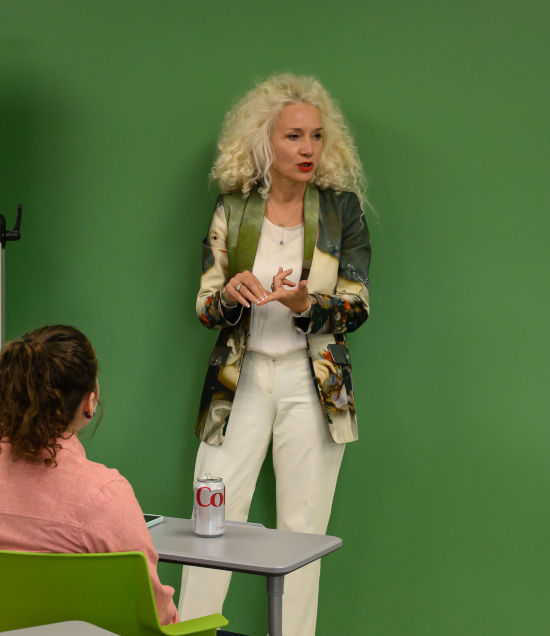
President Radenka Maric, speaking at C2E2 Fuel Cell Warp Event (Terry Barber-Touranud/UConn Photo)
When there is a lack of visibility it can be hard and oftentimes daunting for people to make the steps to advance in their career and be their full potential. Despite the advances we have made towards gender equality, there is still a conversation to be had about the experiences of women in the world of academia, especially in STEM.
The Center for Clean Energy Engineering sat down with some of UConn’s renowned professors (both within the Center and outside) to have a conversation about what it means to be a woman in STEM. While answers varied between professors, there were commonalities among departments and individuals alike. Some felt that they hadn’t faced many difficulties being women in their departments, while some faced adversity when advancing their career paths. While there were some negative experiences that attest to how women still struggle to hold a place in academia, there are positives to show how STEM is changing continuously and creating more equality in the workplace.
Professor Emily Myers, from the Department of Speech, Language, and Hearing Sciences, said that “Men are expected to talk more, and they hold the floor in more conversations. I have struggled to be heard,” While one comment from Prof. Kristen Morgan, from the Department of Biomedical Engineering was that “Biomedical engineering is still male-dominated, and as an African-American woman, there are not a lot of people who look like me. It does affect me, and I have dealt with imposter syndrome.”
These professors are not alone in their feelings of being unheard or unseen. Many of the professors and administrators we spoke with shared similar experiences of needing to work harder to have their voices heard in meetings, to receive recognition for their work, and even to gain the same respect that their male colleagues receive. Despite the many advances we have made towards gender equality, we must acknowledge that there are still many inequalities present in the world of academia, and that these obstacles need to be addressed and removed.
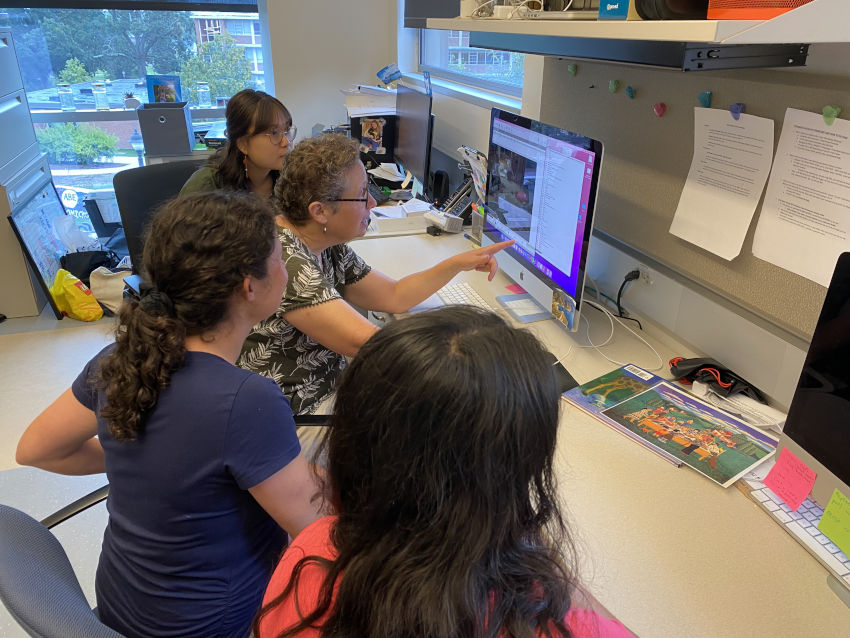
Naigles working with some of her students. (Naigles/UConn photo)
Being heard and seen is also why diversity is so important on multiple levels, outside of just being a woman in STEM. Prof. Letitia Naigles with the Department of Psychological Sciences stated, “Every person has their own perspective. If we only restrict science to certain perspectives, we will miss a lot of science. We will miss out on asking certain questions if we only have a few perspectives, so it is important to acknowledge the many underrepresented groups in science.” Having diversity in STEM opens the door for new perspectives and ideologies that otherwise may not have occurred if everyone was the same. But diversity still continues to be an issue in some places.
While professors faced challenges of being accepted, some had a different experience. Prof. Ioulia Valla, from the Department of Chemical and Biomolecular Engineering, said that her struggle
had more to do with the societal expectations and pressure of being a woman with a career. She said, “Navigating the balance between work, family, and personal growth is more challenging for a woman, which is what I saw in my career. I didn’t have any challenges because of the discipline itself, I think every woman can become whatever she wants. But navigating all the aspects and expectations is more challenging for women.” Not only did the faculty face challenges that were directly resulted from STEM and the prejudice of women in the field, but societal views on women and their place in careers also created challenges.
Prof. Akiko Nishyama, from the Department of Physiology and Neurobiology, also experienced something similar in regard to what society expected. She shared that she attended high school in Tokyo in the 1980s, where it was not as popular for women to be in science. Despite being the first woman to join her graduate program, she was generally met with acceptance. However, she did mention an experience where people would question whether or not she would go join the men and conduct post-mortem exams while studying pathology, furthering how societal views of women can impact their education and careers, especially if opportunities are hindered.
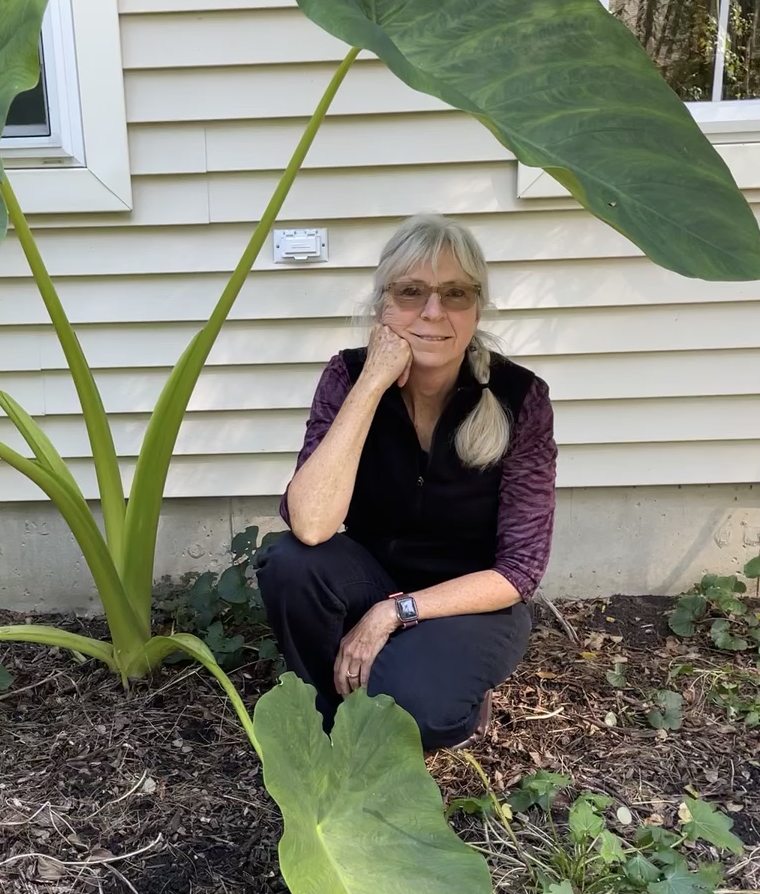
Cynthia Jones in her garden. (Cynthia Jones/UConn photo)
When faced with challenges such as these, it is not uncommon for people to give up. One question that was discussed was if they had ever felt like changing careers while pursuing their goals. Naigles gave her perspective: “I never thought about leaving academia. If I were to ever leave academia, it would be to become an environmental activist.”
Some professors shared this sentiment, while others felt differently: “Yes, I did sometimes think about changing careers, but I would get a good night’s sleep, or take a weekend to think about anything other than my work, and by the end, I was able to put things into perspective,” said Cynthia Jones, a professor emeritus from the Department of Ecology and Evolutionary Biology. Setbacks are universal in all fields and areas of life. STEM setbacks can come in the form of failed experiments, rejected papers, or grant applications, but it should not discourage anyone from pursuing their goals. The way one handles these setbacks and continues to try and work towards their goals, illustrates the strength of women and why they belong in the field.
Overcoming setbacks is not always easy, but with the right support group it may not seem as daunting. Despite their experiences, many of the professors shared that they had strong support systems that helped them to work through challenges and achieve their goals.
“You never stop needing a mentor, or just someone to talk to. Once I started speaking with the women in my department, we all felt more comfortable speaking up in meetings. Sometimes we discuss issues that come with being women in our department, but we talk about other things, too,” shared Prof. Rachel O'Neill from the Department of Molecular and Cell Biology. “My husband is also a scientist, and he has been an equal partner in everything. I have incredible support at home.”
Support systems are beneficial and can help you stay motivated. Many of the professors discussed that staying motivated is an important part of achieving your goals. When we asked them what they would say to other women or younger generations who are interested in, or currently pursuing careers in STEM, motivation was one of the key answers, as well as enjoying what you are studying. You are never going to get far if you don’t enjoy what you do and you don’t find passion in your work. It will be very difficult to deal with hardships if you are not interested in the field you are pursuing.
Prof. Maria-Luz Fernandez, from the Department of Nutritional Sciences looked back on her own experiences as she moved through her academic career: “Don’t get discouraged and stay focused. There will be times when you don’t get the grants you apply for, or your paper is rejected, but you need to stay strong and always have a goal you are working towards. Then, everything will eventually fall into place.”
“I always say, keep going towards your goals, step by step. Regardless of your stage in career and life, you can do it, if you have the right support. Ask for help and offer help. Be proactive, connect with people. Keep building your skills. And finally, leave some time for yourself and your family,” shared Prof. Jasna Jankovic from the Department of Materials Science and Engineering.
Valla said her advice for women and young girls is to not be afraid of failure. It’s okay to fail. “I would say that everything is manageable, no matter how difficult it seems to be. Success is never coincidental. They should not be intimidated to ask for support and help, sometimes that is all it takes to ask for those things.” She explained, asking for help can be intimidating, but asking doesn’t mean one isn’t good enough.
While challenges have occurred and work still needs to be done to address the prejudice surrounding women in STEM, especially for the younger generations, these professors are serving as an example of someone who is being seen and heard within their field. Every professor wanted to emphasize that despite any difficulties they faced, it was always worth it to achieve their goals and advance in their careers. No one person’s experience is the same, but there are often others who are going through similar struggles and talking about them will help other women in STEM realize they are not alone and continue to encourage them and stay motivated to go after their goals.
With navigating the complexities of STEM fields, President Maric shares her wisdom for women to stay motivated despite any challenges one might face: “You are who you believe you are. Don’t compare yourself to others. I compare myself to the Radenka of yesterday and Radenka of tomorrow.”
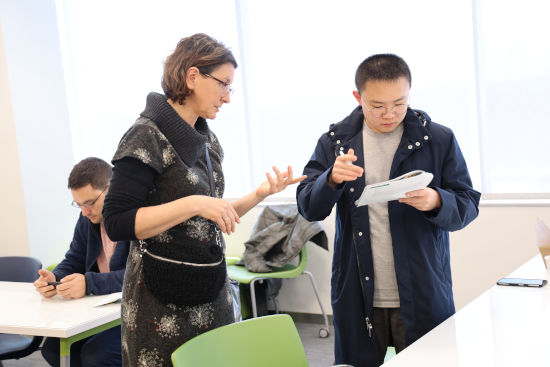
Jasna Jankovic working with her student at the C2E2 GA Research Summit. (Terry Barber-Tournaud/UConn photo)
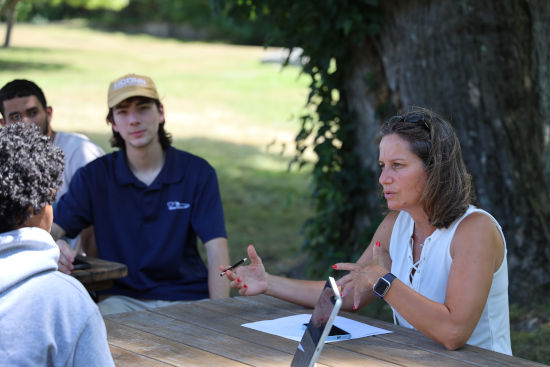
Ioulia Valla working with Students during REU Summer Program. (Terry Barber-Tournaud/UConn photo)

